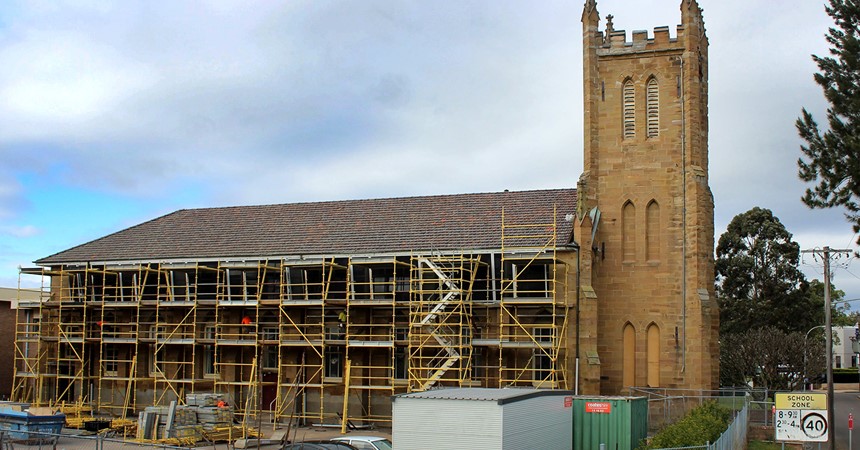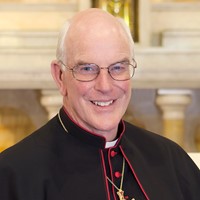St John’s Church at Maitland occupies a significant place in the history of the Diocese of Maitland-Newcastle. With the 1820s church at East Maitland, it provided a home for the spiritual and sacramental support of a growing Catholic population. Following the itinerant ministries of Fr Therry (who founded the first St Joseph’s church at East Maitland in the late 1820s), Fr Dowling and Fr Ullathorne, Fr Watkins and Fr John T Lynch arrived in 1838.
After a few months at East Maitland, Dean Lynch moved to premises in West Maitland where he established a small Mass centre in Plaistowe Street, Horseshoe Bend. From there he ministered to the growing faith community. He also journeyed four times a year on horseback to Tamworth, Armidale and beyond! A man of action, he arranged for the building of the first Catholic churches in Armidale and Lismore.
In October 1840, Bishop Polding and Dean Lynch laid the foundation stone for a more substantial church at Campbell’s Hill. In 1844 this stone was moved to the current site of St John’s, which was finally opened by Dean Lynch in 1846. It served the community well as a parish church for the next 20 years.
When the Diocese of Maitland was established in June 1847, it included only the Borough of East Maitland. It was formed simply to provide a Titular See for the Coadjutor Bishop of Sydney, Bishop Davis, who never visited.
In 1854 a proposal to expand the Titular See into a full diocese was presented to Rome but due to the death of Bishop Davis, this did not proceed and the territory continued to belong to Sydney for the next ten years.
In November 1865 Bishop Murray was appointed Bishop of the Diocese of Maitland. The papal brief which defined its new boundaries was issued on 14 April, 1866.
Bishop Murray returned to Ireland to obtain extra priests for his new diocese and arranged for a community of Dominican Sisters to follow him to Australia. He departed Cork in July 1866 with Bishop Quinn (Bishop of Bathurst), Fr Doyle, who was to join Bishop Murray in Maitland, and another eight priests and 16 nuns, and arrived in Sydney in October. He then set out immediately for Maitland and took possession of St John’s Church as his Cathedral on 1 November, 1866, the Feast of All Saints. It continued as the Cathedral under Bishops Dwyer and Gleeson until Bishop Gleeson opened the nearby church hall as the Pro Cathedral on 26 November 1933.
Newcastle was still a part of the Archdiocese of Sydney and so the expansion of the Catholic faith into northern and north-western NSW was carried out from Maitland, until the Dioceses of Armidale and Lismore were established in 1869 and 1878 respectively.
So Maitland, the only town in NSW to have two Catholic churches, was very much at the heart of the Catholic faith for a large part of the population for many years and St John’s as the Cathedral was central to the broader establishment of the Church in that territory.
In 1872 Bishop Murray paid his first ad limina visit to Rome and detailed the Diocese of Maitland as having a Catholic population of about 22,000, including those from Singleton, Murrurundi, Tamworth, Raymond Terrace, Branxton and the Manning River and districts surrounding those areas. There were 16 Catholic schools, one (Dominican) convent, 18 churches of stone or brick and 26 chapels or churches of wood, many serving as schools on weekdays. There were 14 priests with one resident in Dubbo, Diocese of Bathurst, but sharing pastoral responsibility for a portion of the vast territory of the Diocese of Maitland.
In 1873, Bishop Murray took possession of the Newcastle end of his diocese from the Archdiocese of Sydney. He moved into his new Bishop’s House in Cathedral Street in 1883.
It is apparent that the Church of St John the Baptist in Maitland was central to the development of the Catholic Church in Maitland and northern NSW.
Many could trace their faith stories through family members who were baptised, married, attended Mass or whose funerals were celebrated at St John’s. It is very likely that many who may now be resident across our vast nation or overseas would have similar connections.
It is in this context that I seek your support to preserve this legacy for the generations that follow by repairing and restoring St John the Baptist Church at Maitland and the adjoining Bishop’s House. It is also my wish that these buildings provide a fitting memorial to the deceased bishops who have been laid to rest beneath St John’s.
The first stage, which has begun, will see St John’s and the Bishop’s House restored and refurbished as places of historical significance to the City of Maitland and the Catholics of the diocese. Our broader vision is to incorporate these buildings into a Cathedral Street Precinct which will become a significant public space between the church buildings and the river walkways.
This project is a statement about the significance of the Catholic Church in this region and a celebration of our presence and the contribution of Catholics for over 150 years.
Stage 1 is due for completion mid to late 2016. This project will be a major focus for our activities in 2016, but far from the only way of celebrating 150 years of faith, service and worship.
I envisage the Cathedral Street Precinct becoming a significant destination for visitors to Maitland and pilgrims, a facility for gatherings and meetings, liturgies and ceremonies, including weddings. It will resume its historic role as a central focus of diocesan life!




























































































